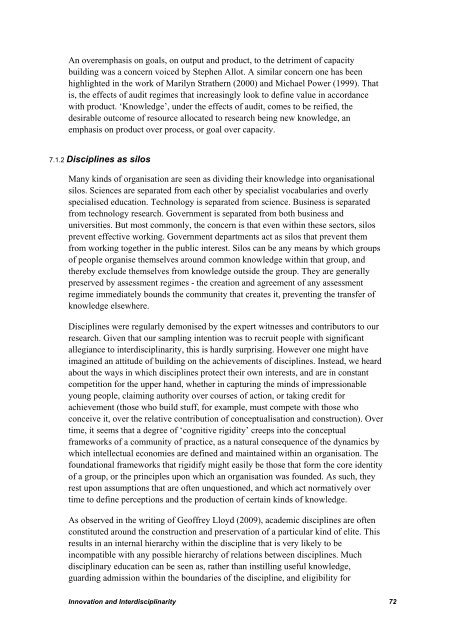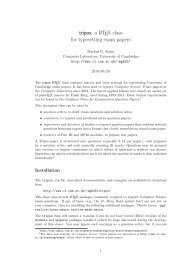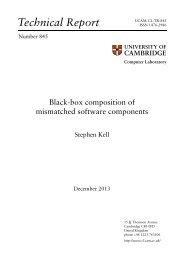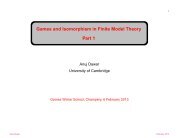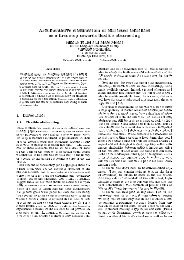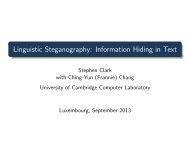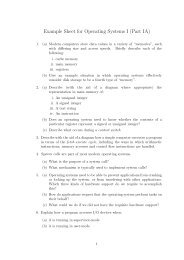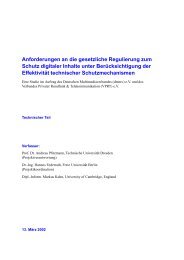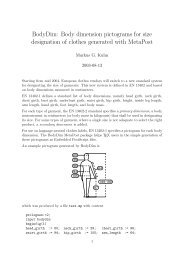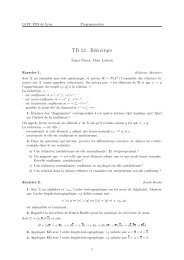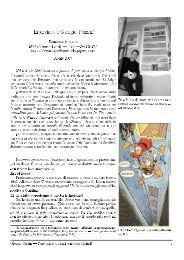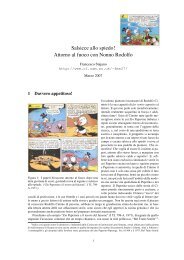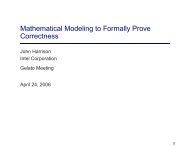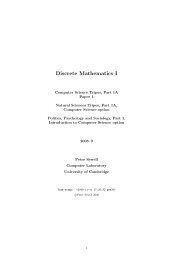Radical innovation: crossing knowledge boundaries with ...
Radical innovation: crossing knowledge boundaries with ...
Radical innovation: crossing knowledge boundaries with ...
You also want an ePaper? Increase the reach of your titles
YUMPU automatically turns print PDFs into web optimized ePapers that Google loves.
An overemphasis on goals, on output and product, to the detriment of capacity<br />
building was a concern voiced by Stephen Allot. A similar concern one has been<br />
highlighted in the work of Marilyn Strathern (2000) and Michael Power (1999). That<br />
is, the effects of audit regimes that increasingly look to define value in accordance<br />
<strong>with</strong> product. ‘Knowledge’, under the effects of audit, comes to be reified, the<br />
desirable outcome of resource allocated to research being new <strong>knowledge</strong>, an<br />
emphasis on product over process, or goal over capacity.<br />
7.1.2 Disciplines as silos<br />
Many kinds of organisation are seen as dividing their <strong>knowledge</strong> into organisational<br />
silos. Sciences are separated from each other by specialist vocabularies and overly<br />
specialised education. Technology is separated from science. Business is separated<br />
from technology research. Government is separated from both business and<br />
universities. But most commonly, the concern is that even <strong>with</strong>in these sectors, silos<br />
prevent effective working. Government departments act as silos that prevent them<br />
from working together in the public interest. Silos can be any means by which groups<br />
of people organise themselves around common <strong>knowledge</strong> <strong>with</strong>in that group, and<br />
thereby exclude themselves from <strong>knowledge</strong> outside the group. They are generally<br />
preserved by assessment regimes - the creation and agreement of any assessment<br />
regime immediately bounds the community that creates it, preventing the transfer of<br />
<strong>knowledge</strong> elsewhere.<br />
Disciplines were regularly demonised by the expert witnesses and contributors to our<br />
research. Given that our sampling intention was to recruit people <strong>with</strong> significant<br />
allegiance to interdisciplinarity, this is hardly surprising. However one might have<br />
imagined an attitude of building on the achievements of disciplines. Instead, we heard<br />
about the ways in which disciplines protect their own interests, and are in constant<br />
competition for the upper hand, whether in capturing the minds of impressionable<br />
young people, claiming authority over courses of action, or taking credit for<br />
achievement (those who build stuff, for example, must compete <strong>with</strong> those who<br />
conceive it, over the relative contribution of conceptualisation and construction). Over<br />
time, it seems that a degree of ‘cognitive rigidity’ creeps into the conceptual<br />
frameworks of a community of practice, as a natural consequence of the dynamics by<br />
which intellectual economies are defined and maintained <strong>with</strong>in an organisation. The<br />
foundational frameworks that rigidify might easily be those that form the core identity<br />
of a group, or the principles upon which an organisation was founded. As such, they<br />
rest upon assumptions that are often unquestioned, and which act normatively over<br />
time to define perceptions and the production of certain kinds of <strong>knowledge</strong>.<br />
As observed in the writing of Geoffrey Lloyd (2009), academic disciplines are often<br />
constituted around the construction and preservation of a particular kind of elite. This<br />
results in an internal hierarchy <strong>with</strong>in the discipline that is very likely to be<br />
incompatible <strong>with</strong> any possible hierarchy of relations between disciplines. Much<br />
disciplinary education can be seen as, rather than instilling useful <strong>knowledge</strong>,<br />
guarding admission <strong>with</strong>in the <strong>boundaries</strong> of the discipline, and eligibility for<br />
Innovation and Interdisciplinarity 72


